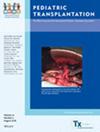小儿实体器官移植的成人和晚期青少年并发症
IF 1.2
4区 医学
Q3 PEDIATRICS
引用次数: 0
摘要
背景自1988年以来,仅在美国就有超过51,000例小儿实体器官移植,导致面临儿童器官衰竭并发症和长期免疫抑制的长期幸存者人数不断增加。结果小儿实体器官移植受者罹患心血管疾病、肾脏疾病、皮肤癌和生长问题的风险增加,但影响的严重程度可能因器官类型而异。小儿受者通常能够完成学业、维持工作,并在成年后组建家庭和社会网络,尽管比例略低于普通人群,但他们面临着与神经认知缺陷、心理健康障碍和歧视有关的额外挑战。为了更好地了解和管理长期并发症,有必要加强儿科和成人移植专家之间的合作。本文章由计算机程序翻译,如有差异,请以英文原文为准。
Adult and late adolescent complications of pediatric solid organ transplantation
BackgroundThere have been over 51 000 pediatric solid organ transplants since 1988 in the United States alone, leading to a growing population of long‐term survivors who face complications of childhood organ failure and long‐term immunosuppression.AimsThis is an educational review of existing literature.ResultsPediatric solid organ transplant recipients are at increased risk for risk for cardiovascular and kidney disease, skin cancers, and growth problems, though the severity of impact may vary by organ type. Pediatric recipients often are able to complete schooling, maintain a job, and form family and social networks in adulthood, though at somewhat lower rates than the general population, but face additional challenges related to neurocognitive deficits, mental health disorders, and discrimination.ConclusionsTransplant centers and research programs should expand their focus to include long‐term well‐being. Increased collaboration between pediatric and adult transplant specialists will be necessary to better understand and manage long‐term complications.
求助全文
通过发布文献求助,成功后即可免费获取论文全文。
去求助
来源期刊

Pediatric Transplantation
医学-小儿科
CiteScore
2.90
自引率
15.40%
发文量
216
审稿时长
3-8 weeks
期刊介绍:
The aim of Pediatric Transplantation is to publish original articles of the highest quality on clinical experience and basic research in transplantation of tissues and solid organs in infants, children and adolescents. The journal seeks to disseminate the latest information widely to all individuals involved in kidney, liver, heart, lung, intestine and stem cell (bone-marrow) transplantation. In addition, the journal publishes focused reviews on topics relevant to pediatric transplantation as well as timely editorial comment on controversial issues.
 求助内容:
求助内容: 应助结果提醒方式:
应助结果提醒方式:


